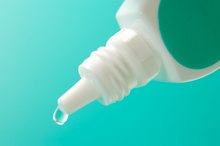How to Improve Inner Ear Circulation
Inner ear circulation refers to the circulation of fluids and blood to the area. A disturbance in the circulation of either can lead to a variety of problems, including dizziness, hearing loss or head noise. Prolonged imbalances in fluids or blood to the inner ear can lead to aggressive conditions such as Meniere's disease, which is characterized by vertigo, hearing loss and ringing noises 1. Medication and diet are two important components in improving inner ear circulation.
If you are experiencing serious medical symptoms, seek emergency treatment immediately.
Medications
A number of medications are effective at improving inner ear circulation. Changes in inner ear circulation can include blood vessel spasms, or sudden constrictions; occlusion, or thickened blood vessel walls that impede blood flow; and hemorrhage, or a rupture of a blood vessel. Circulation to the inner ear is also affected by fluids other than blood that build up in the region.
Vasodilators are a type of blood pressure medicine that can be taken to increase blood flow to the inner ear, thereby alleviating symptoms such as dizziness and ringing noises. Fluid pressure buildup can be treated with a combination of diuretics and anti-dizziness medicines. Diuretics, also known as "water pills," help reduce inner ear fluid pressure.
Inner ear circulation problems that result in serious dizziness problems are sometimes treated by antibiotics. Gentamicin is occasionally used to destroy part of the vestibular system--or the labyrinth of the inner ear--which is responsible for causing vertigo.
Severe inner ear circulation symptoms occasionally must be treated with medicine that is injected by a doctor. Transtympanic injection is a procedure in which a tiny hole is made in the eardrum, a catheter is fitted into the hole and medication then funneled through the catheter into the inner ear region. In cases such as this, the catheter typically remains in place for several weeks.
- A number of medications are effective at improving inner ear circulation.
- Vasodilators are a type of blood pressure medicine that can be taken to increase blood flow to the inner ear, thereby alleviating symptoms such as dizziness and ringing noises.
Diet
How to Increase Circulation in the Arms
Learn More
Complementary to medications, improvements in diet can play an integral role in improving inner ear circulation. Doctors often recommend low-sodium diets since salt can damage and reduce blood flow to the inner ear region. An example of a low-salt diet might include 2,000 to 2,500 mg of salt intake per day. Other circulation inhibitors, such as caffeine, nicotine and alcohol, can also be reduced or eliminated to help improve inner ear circulation.
- Complementary to medications, improvements in diet can play an integral role in improving inner ear circulation.
- Other circulation inhibitors, such as caffeine, nicotine and alcohol, can also be reduced or eliminated to help improve inner ear circulation.
Related Articles
Writer Bio
Lee Simmons has 10 years of reporting experience covering a variety of issues for publications in South Carolina, California, and Texas. He also covered music industry issues for Soundcheck magazine and Bizmology.com, among others. Simmons earned a journalism degree from the University of Texas. He lives in Austin.









